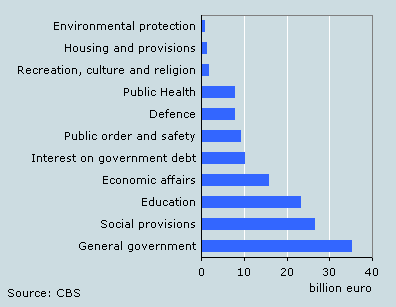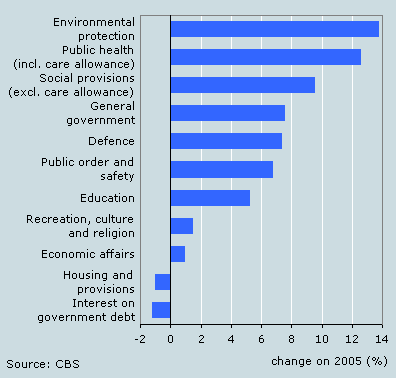Increased government spending in 2006

In 2006 expenditure by the central government of the Netherlands amounted to 141 billion euro. That is 6.2 percent more than in 2005. The gross domestic product (GDP) increased by 5 percent in 2006.
Government expenditure

Higher contributions to the municipalities
In 2006 most was spent on general government (35.3 billion euro). This includes expenditure on public government, Parliament and the advisory councils of parliament and government.
There was a 2.5 billion euro increase in the expenditure on general government in 2006. 1.1 billion euro went to compensate the municipalities for the change in real estate tax – abolishing the ‘user’ charges for dwellings – as of 2006.
More expenditure due to care allowance
The largest increase in 2006 was in the expenditure for social provisions (4.6 billion euro). This increase was due mainly to the introduction of the care allowance (2.5 billion euro).
An extra payment of 1.6 billion euro was made to the pension fund so that the pension (AOW) premium could remain the same. More money went to child care and rent rebates (0.3 billion euro each). On the other hand, expenditure on income support was cut by 0.4 billion euro.
Government expenditure by policy area, 2006*

Changes in financing public health
In 2006 central government saved 2.9 billion euro when compulsory health insurance under the Ziekenfondswet was abolished. This was offset by a 1.9 billion euro contribution to the fund for children under 18 of the new health insurance act.
The increasing deficit in health provision was covered by the increased premium revenues. Households under a given income level are compensated for this with the care allowance (zorgtoeslag), which is considered a social provision. When the care allowance is included, an extra 1.2 billion euro was spent on public health in 2006.
Increase in government expenditure by policy area, 2006*

More money for teachers and classrooms
Dutch government expenditure on education in 2006 was 1.2 billion euro higher than in 2005. government spent 0.5 billion euro more for extra teachers, ICT and housing in elementary education.
In secondary education government spent 0.2 billion euro more on practical training rooms and provision for students with behavioural difficulties. An extra 0.3 billion euro was spent on vocational training (bol), preventing students leaving school without qualifications, and matching education with market requirements.
Fred Arkesteijn